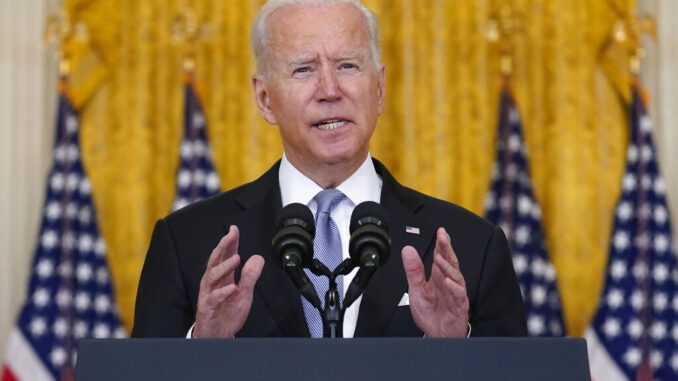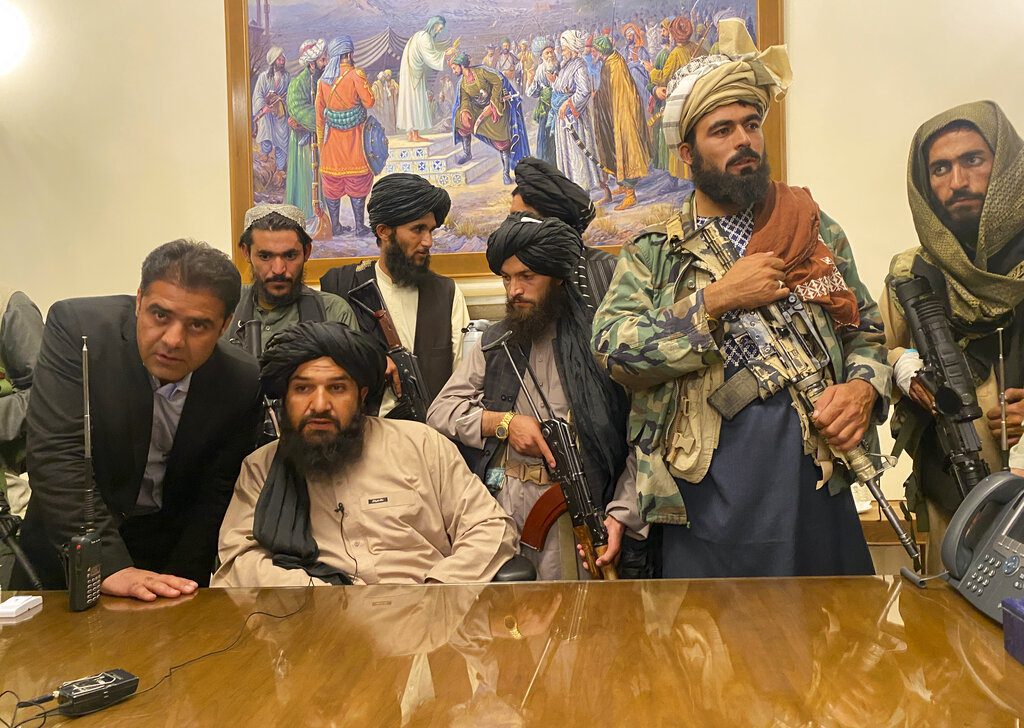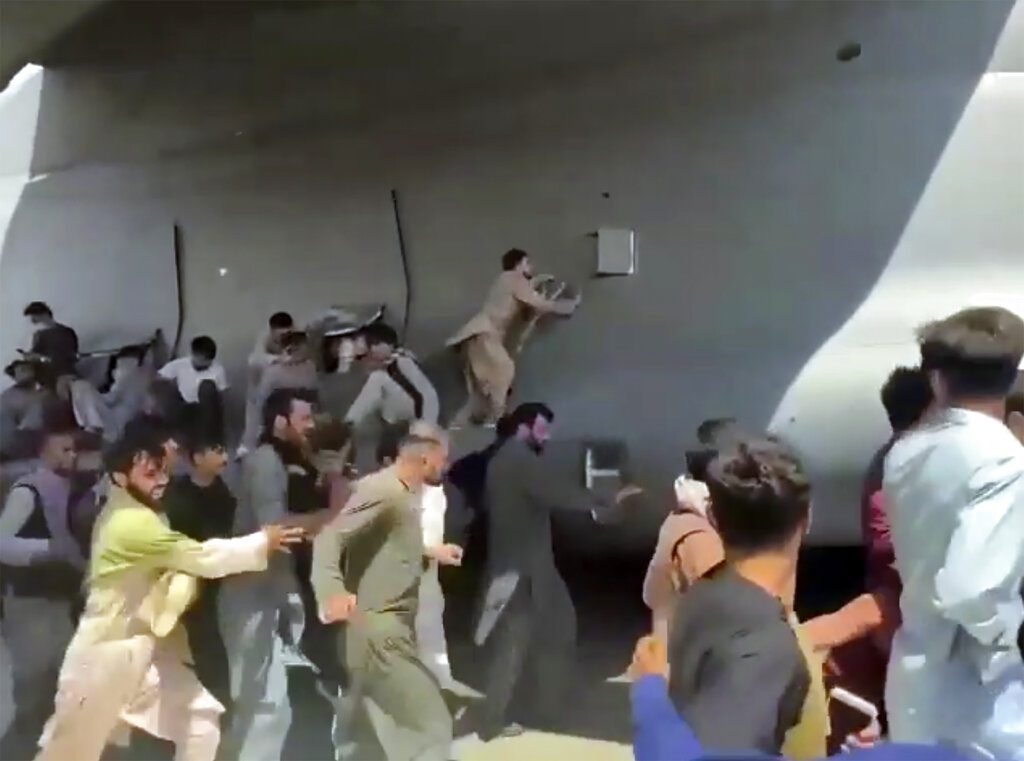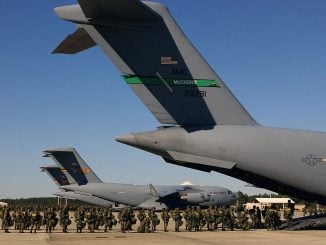
Four presidents share responsibility for the missteps in Afghanistan that accumulated over two decades. But only President Joe Biden will be the face of the war’s chaotic, violent conclusion.

The president fought that reality Monday as he spread blame for the Taliban’s swift and complete recapture of Afghanistan. He pointed to a previous agreement brokered by then-President Donald Trump, expressed frustration with Afghan President Ashraf Ghani and lamented the performance of Afghan national security forces. Republicans overwhelmingly criticized Biden, and he found few vocal backers among fellow Democrats.
The collapse of the Afghan government is the biggest foreign policy crisis of Biden’s young presidency, recalling setbacks for past presidents such as the withdrawal from Vietnam and the botched Bay of Pigs invasion in Cuba. The reverberations of the Taliban’s success were startling, endangering Afghan women and girls, posing new security threats and threatening to undercut global views of America’s reliability.
In the face of such stark consequences, Biden admitted no fault for the chaotic drawdown and instead forcefully defended his move to leave a nation the U.S. has tried to safeguard since it toppled the Taliban regime after the Sept. 11, 2001, attacks, when smoke still rose from the rubble of the World Trade Center.
“Here’s what I believe to my core: It is wrong to order American troops to step up when Afghanistan’s own armed forces would not,” said Biden. “How many more generations of America’s daughters and sons would you have me send to fight Afghanistan’s civil war? I will not repeat the mistakes we made in the past.”
When Biden took responsibility, it was more for ending the war than for the manner in which it happened.
“I know my decision will be criticized. But I would rather take that criticism than pass this on to a fifth president,” said Biden. “I am the president of the United States, the buck stops with me.”
His firm tone differed little from just five weeks ago, when he bullishly predicted what would happen as his Aug. 31 deadline for withdrawal neared. He declared there was going to be no repeat of the humiliating U.S. evacuation from Vietnam nearly a half century ago and “no circumstance where you see people being lifted off the roof of an embassy of the United States from Afghanistan.”
But the devastating images from Kabul rivaled anything witnessed in Saigon.

Thousands of Afghan citizens, many of whom worked as translators and other aides to American troops, thronged the Kabul airport, desperate to escape the Taliban. In heartbreaking footage, some tried frantically to board a U.S. military plane flying to safety, attempting to dash alongside as it raced down the runway.
A few managed to cling to the plane before it took off and video showed several falling through the air as the airplane rapidly gained altitude over the city.
The evacuation received condemnation at home and abroad, with German Chancellor Angela Merkel calling the latest developments “bitter, dramatic and awful.” And security officials warned that Afghanistan would soon provide safe harbor for terrorist groups again.
The Taliban seemed poised to have total of control of Afghanistan on Sept. 11, just as they did on the date two decades earlier when al-Qaida terror attacks plotted from its soil toppled the World Trade Center and damaged the Pentagon. The fallout from 2001 attacks reshaped America’s relationship with the Middle East, and more than 3,000 American and NATO forces died in the resulting combat in Afghanistan during the manhunt for Osama bin Laden and beyond.
Under the command of President George W. Bush, American forces stormed into Afghanistan soon after the terror attacks on a hunt for bin Laden while trying to disrupt al-Qaida’s ability to conduct further assaults on the West. There was immediate success: The Taliban were routed, the terror group disrupted.
But after that came the grinding second phase of the war and a surge of troops from President Barack Obama in 2009. Though Obama later moved to reduce the number of troops, the volume of insurgent attacks and civilian causalities prevented a full drawdown.
Trump announced that the U.S. would pull all its forces out by May 2021, an agreement Biden honored and delayed only slightly. Trump and former officials, though, say they would have only pulled forces once conditions on the ground were met.
Efforts were made, at great expense, across all the administrations to train and arm the Afghan forces once the U.S. departed. But that investment of American blood, time and treasure proved useless as the Taliban conquered much of the nation without a fight and Afghanistan’s president fled the country as soon as the invading forces reached Kabul.
In the upper ranks of Biden’s staff, the rapid collapse in Afghanistan only confirmed the decision to leave: If the meltdown of the Afghan forces would come so quickly after nearly two decades of American presence, another six months or a year or two or more would not have changed anything.
His move to withdraw troops this summer, though polarizing in the national-security community, had been praised by some on both sides of the aisle as timely and appropriate. But on Monday, Republicans slammed Biden’s decision and blamed him for the chaos.
Senate Republican Leader Mitch McConnell, however, had consistently advocated keeping troops in Afghanistan, and he said the military briefings he attended suggested the Taliban would be able to quickly regain power.
“I think the president felt strongly about this, obviously,” McConnell said. “He overruled his own military leaders to do it, and he owns it.”
Biden’s political gamble could prove risky as the scenes of fear and violence from Afghanistan are broadcast around the globe, especially if the chaos in Kabul makes “Saigon look like Disney World,” warned Rep. Adam Kinzinger, R-Ill., a veteran who served in Afghanistan.



